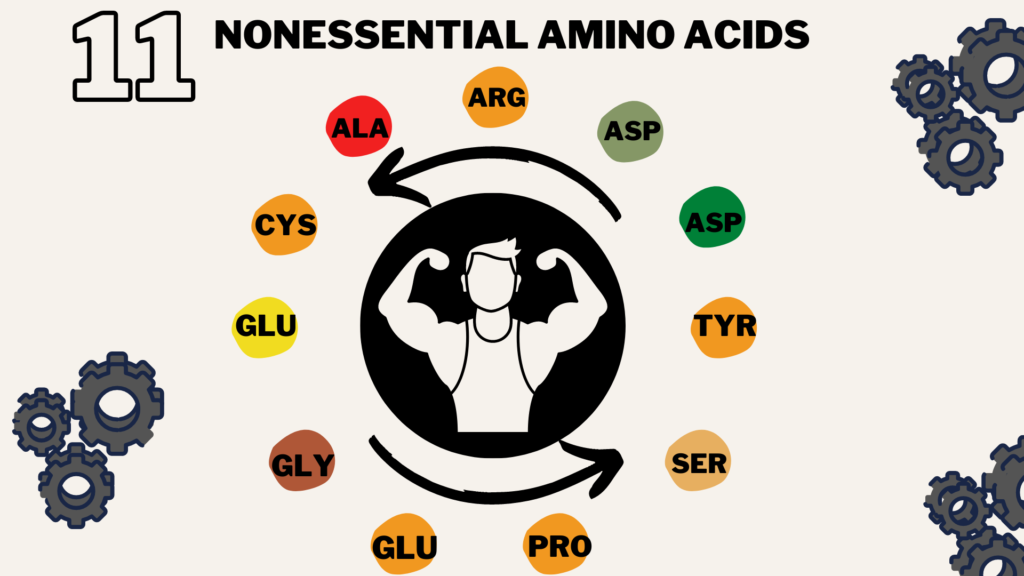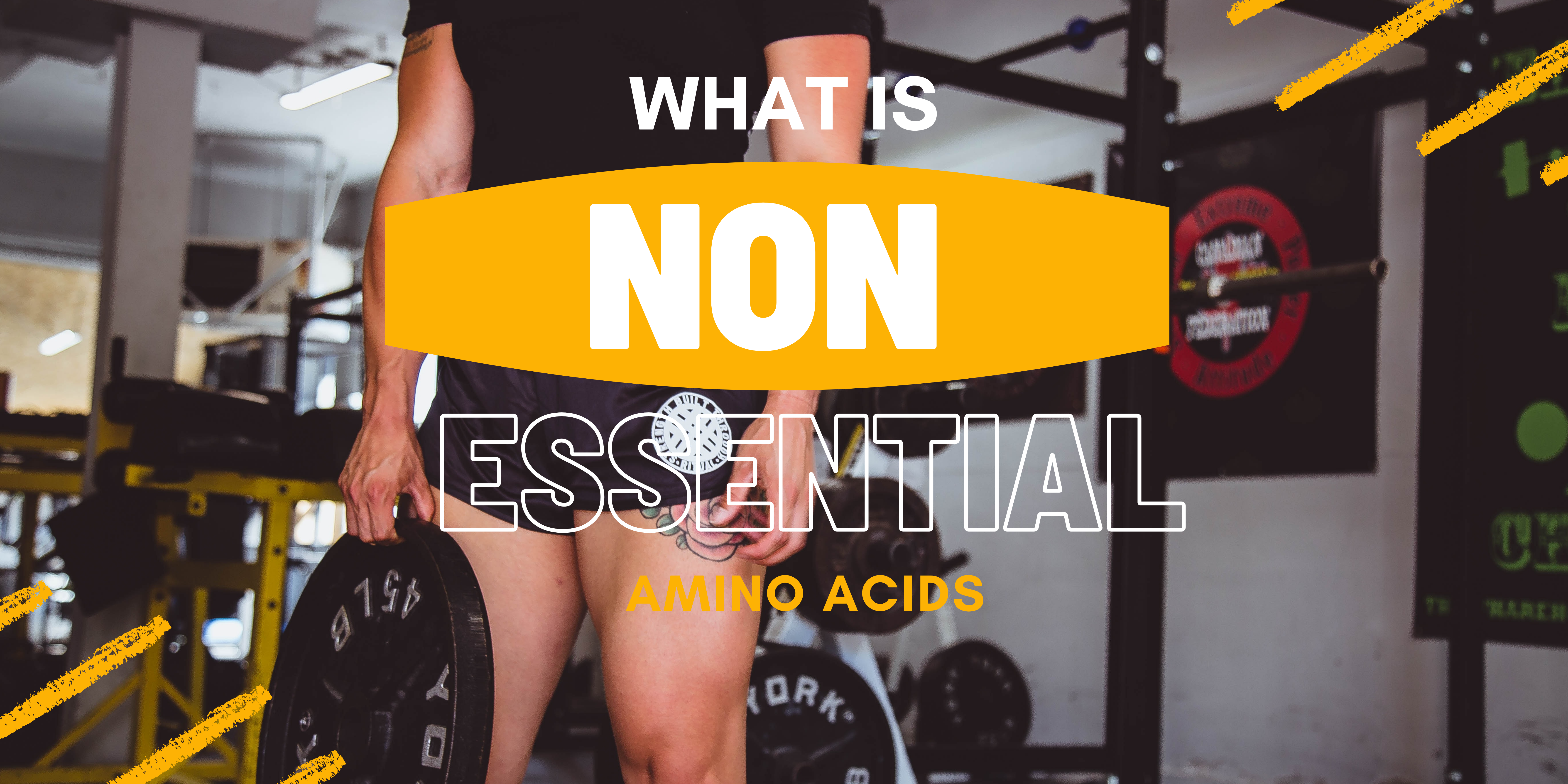I’m sure that you are curious about these interesting nonessential amino acids but didn’t know how exactly these nutrients work on you, why they are important for us, and many more questions related to nonessential amino acids, now your all doubts will be cleared in this article.
About Nonessential Amino Acids
All amino acids chain build the blocks of proteins.
There are a total of 20 amino acids 9 are essential and 11 are nonessential acids these are important to make protein complete.
Our body produced 11 types of amino acids by own self
These amino acids are to be productive and made by our body, for this we do not need to take separate supplements.
You can also take some of the nonessentials through your diet
Non-essential amino acids are also very important for us.
It is good for body functioning activity and is also good for our overall health.
The 11 Nonessential Amino Acids
(What is Nonessential Amino Acids) Let’s take a look at these eleven nonessential amino acids now.

1. Alanine
Alanine is vitally important for muscle and liver functioning.
To make a long story short, athletes who consume L-alanine experience better performance, especially when doing exercises that include producing a high amount of lactic acid in their body such as weight lifting or sprinting.
Alanine can help to decrease the ATP which is an energy source during exercise and as a result, your muscles won’t be as tired from this process which also makes you relieve to prevent muscle fatigue.
2. Arginine
An arginine is a form of amino acid that works to widen the blood vessels by letting blood flow more freely, which can be a help during poor circulation situations.
Important amino acids for body functioning it is also good for the absorption of protein in our body for building muscles and repairing and rebuilding tissue
It is also possible when our body gets low and doesn’t be producing enough amount of arginine ingredients then our body shows signs of deficiency symptoms.
Then you need to fulfill the minimum requirement of l arginine through additional sources
Additional sources are examples include, red meats, fish, dairy, and eggs as well as other smaller amounts here and there.
Recently studies have found that humans are now able to produce arginine in response to low dietary intake.
3. Asparagine
An asparagine is a non-essential amino acid in humans it is a beta-amino derivative of aspartic acid and plays an important role in the biosynthesis of glycoproteins and other proteins.
Asparagine is also used by our bodies to transfer the remaining ammonia out of the system.
This nonessential amino acid is an important nutrient for us also use in to cure their health issues
For example are, hyperammonemia states, cancer, and allergic reactions
In other words, it’s a useful tool in keeping your body healthy.
4.Aspartic acid (aspartate)
Aspartic acid has several functions within the human body.
For example, it helps catalyze or make certain enzymes or proteins with the help of vitamin B3 (pyridoxal phosphate).
Aspartate is a nonessential amino acid that is considered a vitamin for us and combined with other important nutrients in the body.
It can have positive effects on your well-being.
By nature, aspartic acid is found in many foods such as fish, meat, and dairy products.
It may also be produced endogenously within the human central nervous system (CNS).
5. Cysteine
This nonessential amino acid is important for a good body functioning
Our bodies can produce cysteine naturally, there is evidence to suggest that those who suffer from certain health problems like diabetes, flu, inflammatory bowel disease may experience certain benefits when taking the additional supplement.
Our body produced 17 percent of cysteine in our human cells, including those within the upper respiratory tract and skin due to its anti-oxidative properties related to anti-inflammatory substances like glutathione.
Cysteine also has positive effects on people with diabetes due to its ability to increase insulin secretion.
Glutathione production depends on an amino acid called L-cysteine
Glutathione is an antioxidant that is a strong liver detoxifier. It protects the body from Fatigue.
6. Glutamine
Glutamine is the richest amino acid in human blood
It’s one of the most researched aspects of cancer metabolism, Glutamine is also the nutrient that cancer cells require the most.
These investigations were led to finding out if this particular glutamine molecule could be of any use against the uncontrolled growth and the eventual destruction of cancer cells.
This importance is likely due to glutamine’s ability to provide both carbon and nitrogen during various biosynthetic reactions.
This amino acid is a popular supplement amongst bodybuilders because they use it for muscle recovery after workouts.
7. Glutamic acid (glutamate)
Glutamic acid is a nonessential amino acid that the body uses to form proteins and enter glutamine.
This Glutamic acid is a polypeptide that is commonly used to form proteins and in the body, it turns into glutamate.
This polypeptide is needed for sending and receiving neurotransmitters to and from nerve cells,
which can be useful for learning, memory, nervous system contact, pain perception, regulating blood pressure, and helping stomach issues.
This nonessential amino acid helps people, who suffering from achlorhydria (no stomach acid) and hypochlorhydria (low stomach acid)
8. Glycine
Glycine is important to make a complete protein.
This Glycine amino acid increases our glutathione stores and boosts the production of the Nerve Growth Factor
(NGF) which promotes healthy brain cell development.
Studies have shown that ingestion of glycine has a long-lasting and therapeutic effect on central nervous system damage.
Particularly when a person is experiencing prolonged oxidative stress thanks to toxins like alcohol.
9. Proline
Glutamate helps to make proline in our kidneys.
You can see it at the end product of protein metabolism.
Anyone easily absorbs proline directly through foods, supplements, and water.
Proline breaks down into glycine, and then pyruvate.
Proline is a building block for protein used by the body to make collagen and elastin,
which are important for healthy skin, tendons, ligaments, muscle tissue, and blood vessels.
On average people eat 5 grams of proline each day, through high protein foods are steak, salmon, and yogurt
10. Serine
This is one of the nonessential amino acids which important for performing basic body functions this also contains some foods
These are some foods which include serine are, pork, beans, poultry, fish, and dairy products.
Serine comes in two types L-serine and D-serine.
L-serine can be absorbed through diet, or it can be made by the body itself.
D-serine can also be made by the body, but only from L-Serine.
11. Tyrosine
This amino acid will reduce fearfulness, hyperactivity, and forgetfulness in patients with ADHD.
These are some foods for sources of tyrosine such as yogurt, meat, fish, beans, nuts, and whole grains.
The main tyrosines that are good for curing these health issues are depression and stress.
It is also good for improving memory and mental performance under stress, anxiety, and panic attacks
Other studies have proven that tyrosine could protect nerve cells by increasing dopamine production,
which helps to control emotional instability (which is common with depression), headaches, pain tolerance, and immunity levels.
(What is Nonessential Amino Acids)

